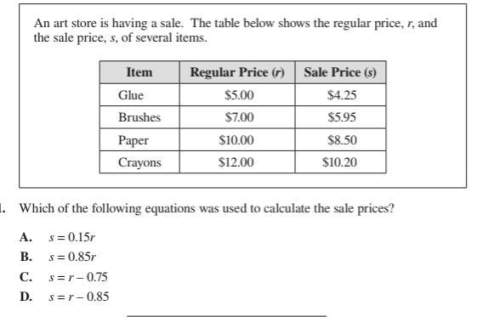
Mathematics, 08.11.2020 21:40 kyrabrown33
Let f(x) be defined for any positive integer x greater than 2 as the sum of all prime numbers less than x. For example, f(4)=2+3=5 and f(8)=2+3+5+7=17. What is the value of f(86)−f(82)?
(A) 3 (B) 4 (C) 47 (D) 59 (E) 83
The answer is not B pls remember this

Answers: 3


Another question on Mathematics

Mathematics, 21.06.2019 13:00
Create a real-life situation and create a system and show how it might be modeled algebraically with a system of equations (or inequalities) show all work include a few sentences explaining the situation, your variables of choice and what each represents, and how you would set it up and solve it algebraically. !
Answers: 1

Mathematics, 21.06.2019 15:00
What is the missing constant term in the perfect square that starts with x^2 -20x
Answers: 1

Mathematics, 22.06.2019 01:30
Apply distributive property to write equivalent equation 105×35m
Answers: 1

Mathematics, 22.06.2019 03:20
Apolice office claims that the proportion of people wearing seat belts is less than 65%. to test this claim, a random sample of 200 drivers is taken and its determined that 126 people are wearing seat belts. the following is the setup for this hypothesis test: h0: p=0.65 ha: p< 0.65 find the p-value for this hypothesis test for a proportion and round your answer to 3 decimal places.
Answers: 3
You know the right answer?
Let f(x) be defined for any positive integer x greater than 2 as the sum of all prime numbers less t...
Questions


English, 22.07.2019 18:00

History, 22.07.2019 18:00

Mathematics, 22.07.2019 18:00

Social Studies, 22.07.2019 18:00



Computers and Technology, 22.07.2019 18:00





Computers and Technology, 22.07.2019 18:10






Medicine, 22.07.2019 18:10

Computers and Technology, 22.07.2019 18:10




